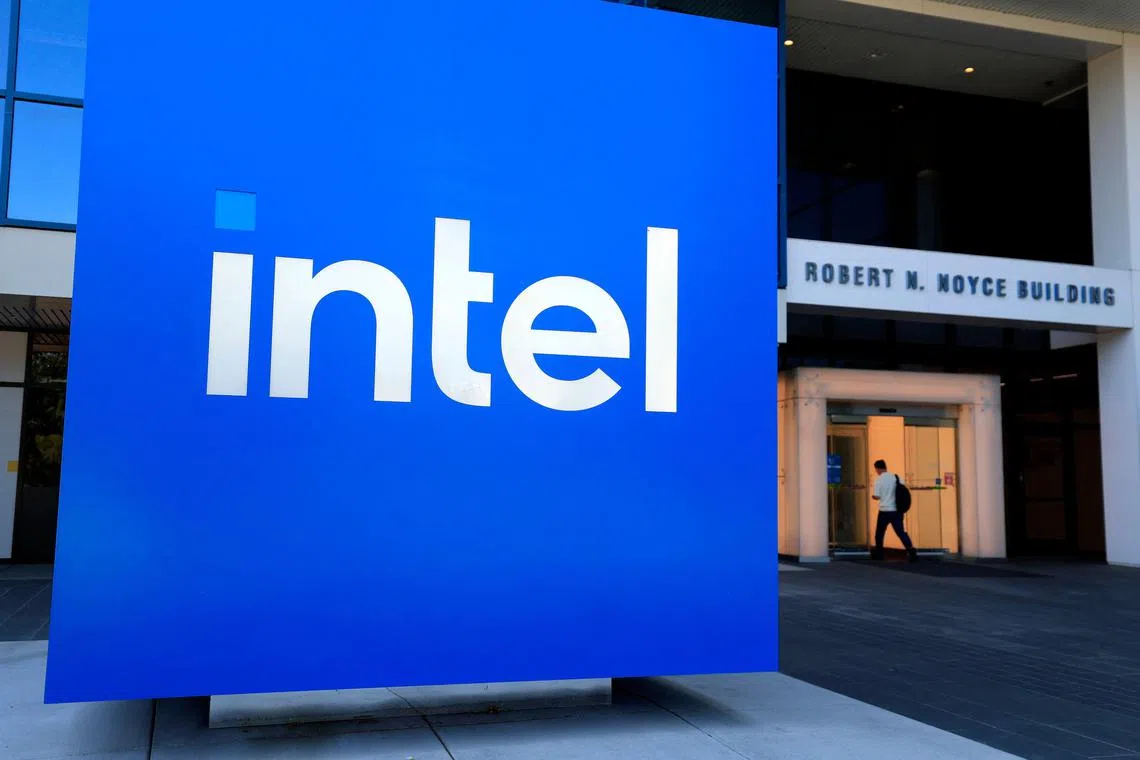SoftBank to invest $2.6 billion in Intel; Trump administration said in talks to take a 10% stake
Sign up now: Get ST's newsletters delivered to your inbox

SoftBank's surprise deal to buy a stake in Intel will shore up a struggling US name while boosting its own chip ambitions.
PHOTO: AFP
TOKYO - SoftBank Group agreed to buy US$2 billion (S$2.6 billion) of Intel stock, in a surprise deal to shore up a struggling US name while boosting its own chip ambitions.
The Japanese company, which is adding Intel to an investment portfolio that includes artificial intelligence linchpins Nvidia and Taiwan Semiconductor Manufacturing Co (TSMC), will pay US$23 a share – a small discount to Intel’s last close.
Shares of the US chipmaker, which will issue new stock to SoftBank, surged more than 5 per cent in after-hours trading. Shares of SoftBank fell as much as 5 per cent on Aug 19 in Tokyo.
SoftBank, which owns chip designer Arm Holdings, has for decades tried to become a central player in AI. Those ambitions sharpened in 2025 with the announcement of Stargate, a US$500 billion endeavour with OpenAI, Oracle and Abu Dhabi fund MGX to build essential data centres in the US. Prior to that, founder Masayoshi Son dreamed of competing with Nvidia in chip design through the “Izanagi” project.
“It’s hard to see how much this investment contributes to either SoftBank’s value or short-term earnings,” said senior analyst Tomoaki Kawasaki from Iwaicosmo Securities.
For Intel, SoftBank’s move delivers a strong vote of confidence in a storied US chipmaker that has struggled to remain relevant in the AI sphere.
Intel aims to prove it can be a technology leader again after falling behind TSMC in contract chipmaking and Nvidia in chip design. Chief executive officer Tan Lip-Bu met US President Donald Trump at the White House last week, helping lay the groundwork for discussions around ways to rescue Intel.
Intel held talks with the Trump administration about a deal that would potentially turn the US into its biggest backer. Officials have discussed taking a stake of about 10 per cent, sources said.
For SoftBank, buying Intel stock expands its US footprint at a time when Tokyo is pressing Washington to cut tariffs in exchange for investments in the US. SoftBank recently inked a deal to buy Foxconn Technology Group’s electric vehicle plant in Ohio, in a move that could kick-start Stargate. That is as some of Asia’s biggest companies including TSMC and Samsung Electronics reiterate plans to spend billions of dollars on factories in the US.
But the timing of the deal – days after Mr Trump and Mr Tan’s meeting – is spurring fears that politics may have played a part.
Mr Amir Anvarzadeh, Japan equity strategist at Asymmetric Advisors, said: “If it’s political, then it’s not profit-motivated. Investing in Intel to appease Trump is perhaps not seen as good business.”
In announcing its investment in Intel, SoftBank paid tribute to the chip pioneer’s history.
Mr Son said in a statement: “For more than 50 years, Intel has been a trusted leader in innovation. This strategic investment reflects our belief that advanced semiconductor manufacturing and supply will further expand in the United States, with Intel playing a critical role.”
Mr Tan, a chip industry veteran who took the helm in 2025, has invested in start-ups alongside Mr Son and spent years on SoftBank’s board as an independent director before resigning in 2022.
“I appreciate the confidence he has placed in Intel with this investment,” Mr Tan said.
Sources earlier said the US federal government is considering a potential investment in Intel that would involve converting some or all of the company’s grants from the US Chips and Science Act into equity. Intel has been slated to receive a combined US$10.9 billion in Chips Act grants for commercial and military production.
At Intel’s current market value, a 10 per cent stake in the chipmaker would be worth roughly US$10.5 billion. The exact size of the stake, as well as whether the White House chooses to move ahead with the plan, is still in flux, the people said.
The White House official also floated the possibility that the administration could convert other Chips Act awards into equity stakes. It is not clear whether that idea has gained traction broadly within the administration or whether officials have broached the possibility with any companies that could be affected.
Using the Chips Act money would mean Intel is not necessarily getting a bigger government infusion than expected – possibly just one that is on a faster timeline. As is the case for all Chips Act winners, Intel’s grant money was originally designed to be disbursed over time as the company hits negotiated project milestones. Intel had received US$2.2 billion in grant disbursements as at January.
Intel’s future has vexed Trump officials since they first entered office. Though TSMC and South Korea’s Samsung Electronics are increasing their operations in the US, having an American company like Intel building cutting-edge chips on domestic soil has been a priority for both the Trump and Biden administrations.
If the Trump administration moves forward with an Intel equity stake, that would fit into a recent pattern that has seen Washington take a more aggressive role in strategic sectors. Mr Trump’s team secured an agreement to receive a 15 per cent cut of certain semiconductor sales to China and took a so-called golden share in United States Steel as part of a deal to clear its sale to a Japanese rival.
The Intel idea also echoes the Defence Department’s unprecedented announcement in July that it will take a US$400 million preferred equity stake in the little-known US rare earth producer MP Materials Corp. That deal would make the Pentagon the company’s largest shareholder, with a roughly 15 per cent stake of the firm’s shares. BLOOMBERG


